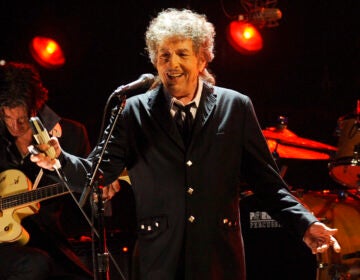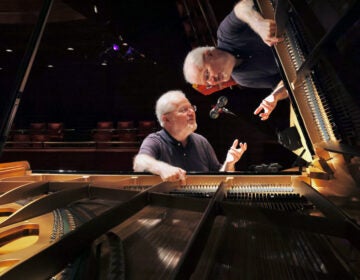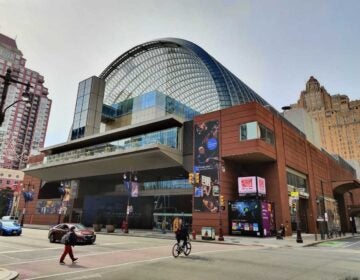Philadelphia Orchestra plans for a pandemic season
The coronavirus forces the orchestra to be nimble and think small.
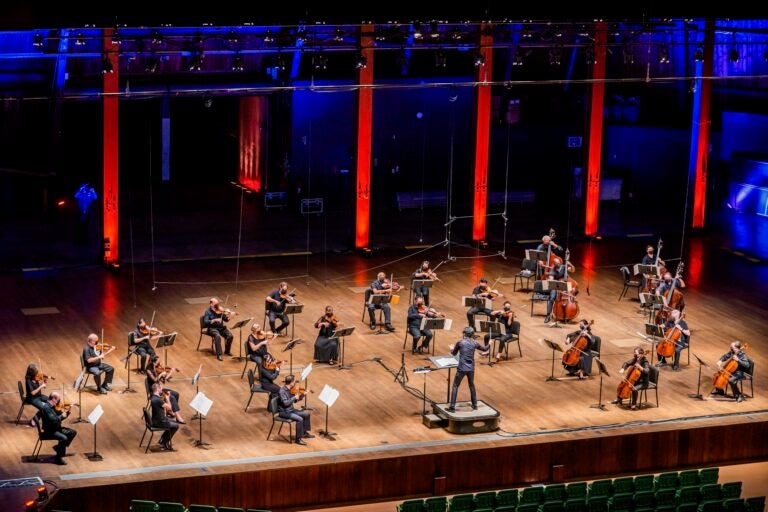
Members of the Philadelphia Orchestra performed at the Mann Center on Aug. 6, marking their first concert since the COVID-19 pandemic halted performances in mid-March. (Chris Lee/Philadelphia Orchestra)
Updated at 6:00 p.m.
–
The Philadelphia Orchestra has announced a new 2020-2021 performance season with online concerts designed for the COVID-19 age. It will include compositions written for smaller ensembles to allow the musicians to safely record together onstage.
In the spring, the orchestra had announced a new season of concerts with the expectation that the pandemic would subside somewhat by the fall. However, as September approaches and the spread of infection remains a danger, the orchestra was forced to scrap what it had planned and re-imagine the season.
“It’s totally different,” said Matías Tarnopolsky, president and CEO of the orchestra. “Because of COVID, it’s not safe to convene a large orchestra in a large concert hall with audiences present. We had to totally rethink what it means to put on a concert.”
The full orchestra is about 100 musicians, ideally performing onstage together elbow-to-elbow. The configuration makes social distancing impossible. Inviting hundreds of audience members to sit in a concert hall to listen is also impossible. Choral works — a personal favorite of conductor Yannick Nézet-Séguin — are particularly fraught with dangers of respiratory infection.
“I know the orchestra through all this is taking every step to be safe, healthy, but also imagine ways not to be silent,” said Nézet-Séguin. “Music cannot be silent, we need music in our lives now, and at every time, in crisis and also in joyful moments.”
The orchestra will be broken up into small ensembles of 25 to 30 musicians, performing in a distanced configuration on the stage of either Verizon Hall at the Kimmel Center or the outdoor stage at the Mann Center. The so-called “Digital Stage” performances will be recorded in a multi-camera shoot, edited and presented online as high-quality films.
Responding to the necessities of the pandemic, the orchestra will be taking a page from composer Igor Stravinsky, who once said: “The more constraints one imposes, the more one frees one’s self.”
“What’s incredible about this moment is not the limitations it brings, but the creative possibilities it opens,” said Tarnopolsky. “For us, it’s a great opportunity to perform and record many of those pieces that, in normal circumstances, we would be thinking, ‘It’s very nice, but we really should be using the full orchestra for a big, grand symphony.’ This is an opportunity for those more intimate pieces of music that are rarely heard from the great symphony orchestras like ours.”
So instead of Beethoven’s Missa solemnis, for example, a mass written for a full orchestra and chorus, the orchestra will play the second movement from Beethoven’s “Symphony No. 7,” a piece written for just 14 instruments, on a program rounded out with a Schubert’s “Unfinished” symphony and a world premiere by composer Carlos Simon, “Fate Now Conquers.”
The orchestra had originally planned to work with artist Refik Anadol, who works with artificial intelligence and data visualization, to create a dynamic virtual environment inside Verizon Hall responding to the music of Missa solemnis. Instead, for the October performance, Anadol will use his AI technology to create streaming visualizations for Beethoven’s seventh symphony.
From its opening gala on Sept. 30 with superstar pianist Lang Lang until Dec. 17 with selections from Tchaikovsky’s Nutcracker, every week the orchestra will present these pre-taped concerts to subscribers. The films will be available online every week from Thursday to Sunday only.
Access to the performances and ancillary content (explanation of the pieces, and interviews with musicians and conductors) will cost $15 per concert, or $39 for a package of three. College students with a membership to the eZseatU ticketing program can get full access to the entire season for $25.
WHYY-TV will broadcast some performances on Channel 12, for free, throughout the greater Philadelphia area. Those details are still forthcoming.
The first streaming concert, Tchaikovsky’s “Serenade for Strings” recorded earlier this month at the Mann Center, will be available for free on Sept. 8, before the season officially begins, as a preview of the fall season.
Members of the orchestra will also form even smaller ensembles — just a handful of players — to perform at Black-owned business and cultural locations around Philadelphia, to be recorded and streamed every week for free. The performances are part of the orchestra’s ongoing HearTOGETHER series, a program of concerts responding to racial injustice.
“The power of music at these really important locations — such as the National Marian Anderson Museum, Harriet’s Bookshop — is very, very powerful,” said Tarnopolsky.
The season will feature several world premieres by contemporary composers, and Valerie Coleman’s “Seven O’Clock Shout,” a work commissioned by the orchestra in the early days of the pandemic. Inspired by an evening ritual in New York when residents would make noise from their balconies in honor of health care workers, the piece is written so that each musician is able to remotely record their individual part, to be mixed together into a whole piece.
The orchestra first presented “Seven O’Clock Shout” in May, and will re-record together as a small group ensemble for the opening gala on Sept. 30

Get daily updates from WHYY News!
WHYY is your source for fact-based, in-depth journalism and information. As a nonprofit organization, we rely on financial support from readers like you. Please give today.



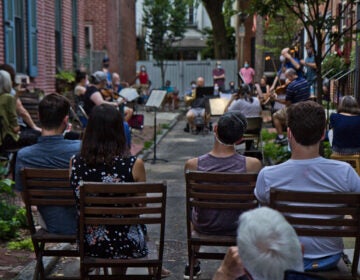
![CoronavirusPandemic_1024x512[1]](https://whyy.org/wp-content/uploads/2020/03/CoronavirusPandemic_1024x5121-300x150.jpg)
